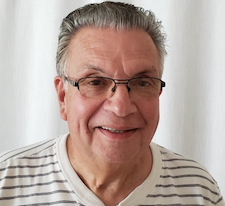Life (During and) After Chase: Gene Ret
And a Great Tip on Privacy
By Gene Ret

It’s funny how time and conditions of the moment can change the meaning and usage of words. “Reinventing one’s self” turned into “pivoting” when businesses were faced with declining sales and customers due to Covid. And so was the case with my career at Chase.
Since I began employment in 1974, my career had always involved managing the securities-related businesses supporting Wall Street and Treasury-related functions. In the later part of my time at Chase, however, I was positioned within an internal control and compliance capacity, and in 1999 was asked to assume the duties of a newly created position: Senior Privacy Compliance Officer, reporting to the Chief Privacy Officer.
This was an exciting endeavor as we were at the cusp of new groundbreaking legislation and regulations involving the safeguarding of customers' data, requiring new compliance requirements and the development of Chase’s Privacy Policy to be published and provided to all retail accounts annually. But customer choices regarding the use and sharing of their personal information was also a key part of new privacy regulations. This posed challenges to every consumer business in the retail bank (Mortgage, Credit Card, Auto Finance and all other consumer deposit or lending products in Retail Banking), as their marketing and cross-sell activities would need to observe consumers' preferences regarding the sharing of their information between affiliates and third parties, as well as the customers' marketing contact preferences already on file (i.e. do not call, do not mail ). A centralized Customer Information File (CIF) was expanded and enhanced to support these new privacy values, and each business unit was tasked to ensure that their marketing programs were properly screened against customers' preferences posted in CIF.
I managed the annual Privacy Notice mailing to all retail customers through 2004, as well as ensuring that all retail businesses properly managed their marketing programs by observing customers' preferences as listed in CIF. New compliance ground was being broken annually as the internet explosion posed new and challenging issues concerning customers' information, and, absent any additional new federal laws, many states began to issue their own privacy regulations.
We in turn worked with each business to ensure its understanding of new regulatory requirements and the protocols required to comply with these requirements. In partnership with the American Bankers Association (ABA), we developed an educational video on the proper safeguarding of customer data for internal distribution and viewing as well as for use by all other ABA member banks. We hired John Stossel of ABC News to moderate the film, and it was considered a best-in-class demonstration of privacy awareness and education.
It is with this as background that I was advised that my position was being absorbed by a Bank One contingency, and, in May of 2004 I accepted the retirement package offered me. As luck would have it, the privacy, compliance and project management skills honed at Chase served me well. The privacy related regulation Gramm-Leach-Bliley Act (GLBA) and other new regulatory activities such as Sarbanes Oxley and Federal Deposit Insurance Corporation Improvement Act (FDICIA), resulted in enhanced financial reporting and control requirements for financial institutions. Additionally, there was increased vigilance against money laundering and Know Your Customer requirements. This increased need for compliance and project management skills enabled me to begin independent consulting, and I was steadily employed by Resources Global Professionals for nine years, managing compliance-related projects as described above. Consultant staffing was vigorous and aplenty; as these regulation requirements were in their infancy, most firms were hesitant to increase full-time staff to address and complete the new compliance tasks. These projects took me coast to coast, serving clients in Boston, Denver, San Diego and San Francisco, though the majority were in the NYC metropolitan area.
By 2013, project management needs and related employment had slowed, so I went about looking for other opportunities. As luck would have it, HSBC was looking to re-build their Privacy Office, and I was hired as their Senior Compliance Privacy Officer. It was a similar position to what I had at Chase, but it also afforded me expanded responsibilities as the Compliance Officer responsible for four federal regulations involving privacy. In addition, all customer correspondences concerning privacy were approved by me to ensure consistency in messaging. This provided me ongoing data concerning our customers' views and issues concerning privacy, and the ability to identify any root causes of privacy issues.
Pro bono Guidance
In 2016, I had decided that a quasi-retirement was in order, so I resigned from HSBC. I began to see a need among the general public regarding privacy information. Data breaches and cases of Identity theft were on the rise, and risks related to the misuse of personal information had dramatically increased with the explosion of products and services available online. Additionally, I found that consumers were longing for information concerning the avoidance of and recovery from identity theft, how to better manage privacy preferences for marketing contact and restricting the sharing of their personal information, and what practices should be followed when surfing the web to remain as anonymous as possible and lessen the chance of becoming a victim of account takeover and fraud.
I developed a program and PowerPoint presentation addressing the history of privacy and the best practices to protect personal information and recover from from identity theft and fraud. What a great way to stay involved (at a more leisurely pace) in a subject that interested me and that I was good at, assisting consumers to navigate the steps involved.
I have found much interest by community organizations and social clubs for my program. I now offer the approximately one-hour presentation pro bono, in the hopes of assisting consumers to navigate the pitfalls in safeguarding their personal information, and offer individual counseling and recovery services to assist in ID Theft resolution. I also offer periodic privacy hints in local periodicals such as the following:
 Are you tired of receiving unsolicited pre-approved credit card offers? Do you view this not only as an annoyance but also as a misuse of your personal information? Credit bureaus are permitted to provide the names of consumers to financial substitutions who meet the credit criteria established by the financial institution.
Are you tired of receiving unsolicited pre-approved credit card offers? Do you view this not only as an annoyance but also as a misuse of your personal information? Credit bureaus are permitted to provide the names of consumers to financial substitutions who meet the credit criteria established by the financial institution.
Those pre-approved credit card offers are more than annoying. If a criminal steals your mail, fills out a credit card application that’s been pre-approved and sends it in they’ve just applied for a credit card…in your name.
Now they just have to watch for it to arrive in your mailbox. Once it does they’ll be able to go shopping armed with your credit card. It’s that easy. So what can be done to combat it? You may not have requested these pre-approvals, but it’s your credit that’s damaged in this scheme.
Several years ago the Consumer Credit Reporting Companies acted to alleviate consumer anxiety by providing a means to stop to credit card and insurance solicitation. You know these credit reporting companies as EquiFax, Experian, TransUnion and Innovis.
Together they created Optoutprescreen.com so that consumers could send in requests for removal (opt out) from pre-approved credit card and insurance offers. These offers are also referred to as “firm offers” of either credit or insurance.
So take a tip from “Rets Tips” – and go to Optoutprescreen.com to stop unwanted credit offers.
This is one example of the types of educational pieces I include in my sessions and in local periodicals.
So in closing, a career “pivot” resulted in a new area of discovery for me. A discovery that played to the skill sets I had developed in Compliance, my love of personal contact and the joy of creating value. So, in the words of Steve Jobs: The only way to do great work is to love what you do. If you haven't found it yet, keep looking. Don't settle.
Comments
Do you have comments or a story of your own?Please send to news@chasealum.org. You can have it fully written or ask to be interviewed.
